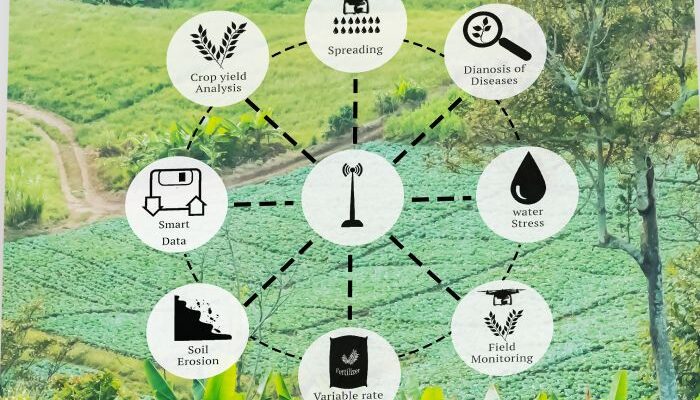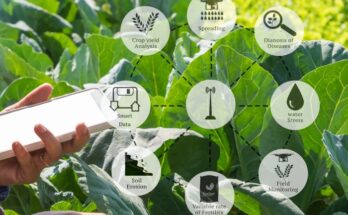Agriculture 4.0 embodies the fourth agriculture revolution that makes use of digital technologies and has shifted towards a smarter, more environmentally responsible, and more resourceful agriculture sector. Agricultural technologies have emerged to enhance sustainability and discover more effective farm methods. This encompasses all digitalisation and automation processes, including Artificial Intelligence (AI), robotics, big data, the Internet of Things (IoT), and virtual and augmented reality. From a real-world perspective, it brings us to precision farming.
Precision Farming Software-as-a-Service (SaaS)
Precision farming Software-as-a-Service (SaaS) is playing a significant role in transforming the sector. As per a report by EMR, the Indian agriculture market was valued at USD 435.9 billion in 2022. It is further anticipated to grow at a CAGR of 4.9 per cent between 2023 and 2028 and reach a value of USD 580.82 billion by 2028. Furthermore, the TechSci Research report, “India Precision Agriculture Market by Technology” highlights that India’s precision agriculture market is projected to grow at over 10 per cent to reach US$99 million by 2025 due to increasing apprehensions for food security and growing demand for maximising yields.
You may also like to read: Technology adoption is key to sustainable regenerative farming
Precision agriculture offers a data-driven strategy for efficiently growing and sustaining crops on cultivable land, allowing farmers to use most of the resources at their disposal. Even in the supply chain, daily operations generate a huge amount of data. Most of this information was previously untouched, but with the help of big data technologies, such information can be used to advance the performance and production of any crop. Depending on the crop type and its growth needs, digitised harvesters can help deal with vast areas in diverse situations, predominantly agriculture.
Emerging technologies in precision farming for Indian agriculture
Technologies such as remote sensing are becoming pivotal in gathering crucial data on soil moisture, crop health, and crop yields. Remote sensing enables farmers to monitor large areas efficiently, which is facilitated by satellite imagery and ground-based sensors. It offers actionable insights into the condition of their crops and soil.
Furthermore, drones are becoming a cornerstone of modern agriculture. They can be employed for various purposes, such as crop monitoring, aerial surveys, and even spraying pesticides. Drones are also crucial for collecting valuable data, and helping farmers assess crop health, growth patterns, and potential problem areas.
Also, geospatial technology has a significant role in generating maps and analysing spatial data. These technologies help farmers better understand their land, plan irrigation systems, and optimise planting patterns based on soil variability and topography.
You may also like to read: FarmERP strengthens its agritech services by offering 8 new languages, including Spanish and French
In addition, machine learning algorithms are helping to examine intricate datasets to make predictions about various factors, such as crop yields. These insights empower farmers to make informed decisions about planting times, fertilisation, and pest control, ultimately leading to improved productivity.
Artificial Intelligence-driven automation is also helping to manage agricultural tasks more efficiently. AI-powered systems can automate irrigation, predict disease outbreaks, and optimise resource allocation, making crop management more precise and effective.
The adoption of precision agriculture technologies is driven by the need to enhance crop yields, enhance sustainability and reduce input costs. The Government of India is also actively promoting the adoption of these technologies through various policies and schemes.
Benefits of using emerging technologies and precision farming SaaS for Indian agriculture
Precision farming can boost crop yields, ensuring that farmers can produce more food with the same amount of land. It can also help bring down input costs as resources like water, pesticides and fertilisers are used more resourcefully. Moreover, by minimising water and chemical usage, precision agriculture enhances sustainability and reduces the environmental impact of agriculture. Furthermore, precision farming arms farmers with real-time data and insights, enabling them to make informed decisions about crop management, leading to improved productivity.
The adoption of emerging technologies and SaaS for precision farming is still in its early stages in India, but it is growing rapidly. With the sector witnessing high technological advancements that are affordable, it is set to revolutionise Indian agriculture, making it more efficient, sustainable, and productive.
(Views expressed in the article are author’s own. Dr. Sat Kumar Tomar is the founder & CEO of Satyukt Analytics.)





